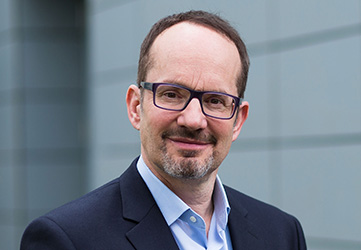23 mars 2017: Prof. Anthony Hyman
Jeudi 23 mars 2017
12h30, CMU - C150
Prof. Anthony HYMAN
Director and Group Leader
Max Planck Institute of Molecular Cell Biology and Genetics

«Like oil and water: phase separation in the cytoplasm and implications for neurodegeneration»
Cells organize many of their biochemical reactions by formation and dissolution of non-membrane-bound compartments. Recent experiments show that a common mechanism for such biochemical organization is phase separation of unstructured proteins to form liquid-like compartments. These liquid-like compartments can be described by principles elucidated from condensed-matter physics and are therefore termed biomolecular condensates. I will discuss the relationship between the formation of liquid like compartments, and the onset of aggregated-protein pathology that is commonly observed in neurodegenerative diseases.
"Anthony Hyman is an outstanding cell biologist and an excellent and inspiring speaker.
In addition to the many findings in the field of cell division, his original approach has led to the discovery that cells can organize biochemical reactions in liquid-like membrane-free compartments that separate from the rest of the cytoplasm like oil separates from water.
This discovery has important implications for the understanding of human disease since with age or metabolic changes liquid-like compartments can convert into more solid structures found in neurodegenerative disorders."
Monica GOTTA, Host
Département de physiologie cellulaire et métabolisme, UNIGE
Biography
Prof. Dr. Anthony Hyman is Director and Group Leader at the Max Planck Institute of Molecular Cell Biology and Genetics.
In 1984 he received his BSc first class in Zoology from the University College in London, where he had also been working as research Assistant in 1981. From 1985 to 1987 he wrote his PhD about “The establishment of division axes in early C.elegans embryos” under the supervision of Dr. John White at the Laboratory of Molecular Biology, MRC in Cambridge, England. After that he moved to San Francisco where he did his postdoctoral research in the lab of Prof. Tim Mitchison at the University of California investigating the mechanism of chromosome movement studied in vitro. 1993 he became Group Leader at the European Molecular Biology Laboratory in Heidelberg, before he moved to Dresden in 1999 as one of the founding directors of the Max Planck Institute of Molecular Cell Biology and Genetics. 2002 he was named honorary Professor of Molecular Cell Biology at the Technical University Dresden. The year after he was awarded the EMBO Gold Medal. In 2007 he was elected as a Fellow of the Royal Society and was awarded the Leibniz Prize in 2011.
His research covers the mitotic spindle assembly and function, focusing on centrosomes; distribution of force generating mechanisms necessary for the first asymmetric division; establishment of cortical polarity. He primarily works in C.elegans embryos, but is also studying aspects of these problems in Human cells using the emerging techniques of BAC transgenesis.
